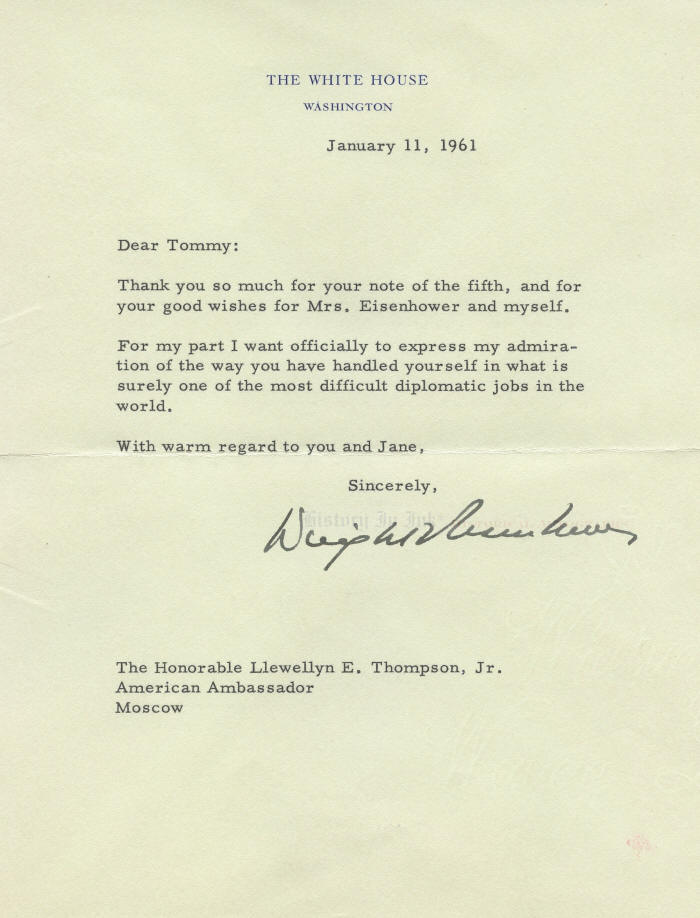

1403306
Dwight D. eisenhower
From the Estate of Llewellyn E. Thompson,
United States Ambassador to the Soviet Union
Eisenhower describes the position of United States Ambassador to the Soviet Union
as “surely one of the most difficult diplomatic jobs in the world”
Dwight David Eisenhower, 1890-1969. General of the Army; Supreme Commander, Allied Expeditionary Force, World War II; 34th President of the United States, 1953-1961. Typed Letter Signed, Dwight D. Eisenhower, one page, 6¾" x 8⅞", on stationery of The White House, Washington, [D.C.], January 11, 1961. With original envelope.
In one sentence, President Eisenhower sums up the Cold War tensions that affected American relations with the Soviet Union throughout his years in the White House. Writing at the close of his administration, Eisenhower thanks Ambassador Lewellyn E. Thompson, Jr., for his work in a trying atmosphere. He writes, to “Dear Tommy,” in full: “Thank you so much for your note of the fifth, and for your good wishes for Mrs. Eisenhower and myself. / For my part I want officially to express my admiration of the way you have handled yourself in what is surely one of the most difficult diplomatic jobs in the world. / With warm regard to you and Jane . . . .”
Eisenhower had ample reason to describe the job as he did. Soviet relations with the United States chilled after World War II as the Soviet Union exerted its influence—or simply imposed its will—on the satellite states of Eastern Europe. Relations were strained not only by what the United States viewed as the Soviet Unionʼs failure to keep the agreements that it made at Yalta, but also by the Korean War, which began in 1950, and Soviet support for the Communist government in North Korea. When American nuclear research produced the hydrogen bomb in 1952, the Soviets followed suit in 1953. Although the “Big Four" Geneva Summit in July 1955, led by the United States and the Soviet Union, helped to ease world tension for a time, the Cold War got cold again when the Soviet Union sent troops to crush the Hungarian Revolution in late 1956, driving some 180,000 refugees into Austria and another 20,000 into Yugoslavia. The warmth of the cultural exchange that came out of the Geneva Summit cooled in July 1959 when Soviet Premier Nikita Khrushchev confronted then-Vice President Richard Nixon, who was in Moscow to open the American National Exhibition, engaging him in a series of impromptu hard-hitting ideological debates that covered the range of Soviet-American relations—the threat of atomic war, diplomacy by ultimatum, and economic progress. The famous “Kitchen Debate" impressed Khruschev with Nixonʼs tough mindedness and strong will, but it moved him to do everything he could to cause Nixon to lose the 1960 presidential election to John F. Kennedy. When the Soviet Union shot down an American U2 spy plane in May 1960, just before another scheduled “Big Four" summit, and then caught the Americans lying to cover up the mission by producing pilot Gary Powers alive, anti-American sentiment in the Kremlin exploded. Eisenhower and Khrushchev went to Paris, but Khrushchev left the day after the meeting began when Eisenhower refused to apologize for the espionage. Much to Eisenhowerʼs disappointment, Khrushchev publicly withdrew his previous invitation for Eisenhower to visit the Soviet Union.
Khrushchev, who led the Soviet Union throughout Eisenhower's eight years as President, was a volatile man with whom the United States had continual difficulties. Yet Khrushchev himself had to deal with Politburo hard-liners who distrusted the United States and pressured him not to take even the conciliatory steps that he sometimes took.
Anti-Communist hysteria in the United States also contributed to the difficulties. Demagogic Senator Joseph McCarthy's unsubstantiated charges of Communist infiltration in the American government, particularly in the State Department, and hearings by the House Committee on Un-American Activities fueled the anti-Soviet atmosphere. Billboards and advertisements urging impeachment of Chief Justice Earl Warren and Associate Justice William O. Douglas appeared around the country when the Supreme Court decided four seemingly pro-Communist decisions on “Red Monday" in June 1957.
Thompson (1904-1972) was a career American diplomat who served at a critical time in history as the United States Ambassador to the Soviet Union under Presidents Eisenhower, John F. Kennedy, and Lyndon B. Johnson. Thompson joined the Foreign Service in 1928, and during his long and distinguished career he served as the United States Ambassador to Austria from 1955 to 1957 before Eisenhower appointed him Ambassador to the Soviet Union in 1957. Kennedy reappointed him in 1961. He resigned in 1962 to become Ambassador At Large and a special advisor to Kennedy on Soviet affairs, but Johnson reappointed him to Moscow in 1967, and he served until 1969. He also held the post of Career Ambassador. He was a member of the Executive Committee of the National Security Council, or ExComm, which advised Kennedy during the Cuban Missile Crisis in 1962, and he was present at Johnson's summit with Soviet Premier Alexei Kosygin at Glassboro, New Jersey, in 1967. When Nixon became President, Thompson came out of retirement to advise him on the Strategic Arms Limitation Treaty (SALT) negotiations with the Soviet Union and represented the United States in the SALT talks from 1969 until he died in 1972.
This letter is in very fine condition. Eisenhower has signed it with a bold 3⅝" black fountain pen signature. It has one horizontal mailing fold, which does not affect the signature, and a tiny red mark in the blank lower right corner. The original envelope, which was sent via diplomatic pouch and therefore has no postal markings, was cleanly opened at the top and is in fine to very fine condition.
Provenance: This letter comes directly from Ambassador Thompson's estate. We are pleased to be able to offer it for the first time on the autograph market.
Unframed.
_____________
This item has been sold, but
click here to see other
Presidents and First Ladies items
that we are offering.



